THE RELATIONSHIP BETWEEN PHYSICAL THERAPY AND PSYCHOLOGICAL OUTCOMES IN BURN PATIENTS: THE MEDIATING ROLE OF COPING SELF-EFFICACY, ACCEPTANCE OF DISABILITY AND RESILIENCE
DOI:
https://doi.org/10.71146/kjmr545Keywords:
Sleep, screen time, physical activity, Pittsburgh sleep quality index , Perceived stress scaleAbstract
Introduction: Burn injuries often result in profound physical and psychological challenges. Previous research has indicated that coping self-efficacy, acceptance of disability, and resilience play crucial roles in the rehabilitation of burn patients. This study aims to explore the mediating role of these psychological factors in the relationship between physical therapy and psychological outcomes in burn patients.
Method: A cross-sectional observational study was conducted involving burn patients undergoing rehabilitation. Data were collected from 200 participants using the Burn Specific Health Scale (BSHS), Coping Self-Efficacy Scale (CSE), Acceptance and Action Questionnaire (AAQ), and the Connor-Davidson Resilience Scale (CD-RISC). Statistical analysis was performed using SPSS version 25.0, which included descriptive analysis and multiple regression analysis to determine the mediating effects.
Result: The findings revealed that higher levels of coping self-efficacy, acceptance of disability, and resilience were significantly associated with better psychological outcomes in burn patients. Specifically, coping self-efficacy and resilience showed a strong positive correlation with improved psychological well-being, while acceptance of disability was linked to reduced psychological distress. Physical therapy was found to enhance these psychological mediators, thereby improving overall psychological outcomes.
Conclusion: This study highlights the critical role of coping self-efficacy, acceptance of disability, and resilience in the psychological recovery of burn patients. Enhancing these factors through targeted physical therapy interventions can significantly improve psychological outcomes and quality of life for burn survivors.
Keywords: Sleep, physical activity, screen time, international physical activity questionnaire (IPAQ), Pittsburgh sleep quality index (PSQI), Perceived stress scale (PSS)
Downloads

Downloads
Published
Issue
Section
License
Copyright (c) 2025 Dr. Erum Tanveer, Dr. Vinod Kumar, Arsal Mushtaq, Anisa Altaf, Mehwish Ahmed, Dr. Hamza Ahmed (Author)

This work is licensed under a Creative Commons Attribution 4.0 International License.






